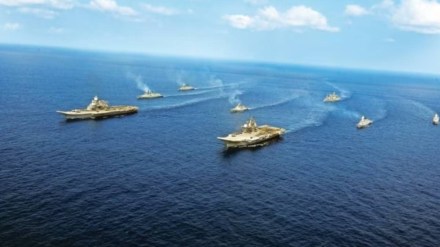New Delhi, Jan 12
The strikes in Yemen, initiated by the United States at 5 am IST and supported by the United Kingdom, Australia, Canada, Netherlands, and Bahrain, mark the first significant military intervention in response to the Iran-backed Houthi group’s targeting of international shipping in the Red Sea since late last year.
President Joe Biden’s late Thursday statement emphasized that these targeted strikes are a strong message against attacks on personnel and threats to freedom of navigation. The cautionary note regarding potential further action indicates the seriousness with which the United States and its partners view the situation.
In the Indian context
The talks between US Secretary of State Antony Blinken and Indian External Affairs Minister S Jaishankar centered on shared concerns over reckless Houthi attacks in the southern Red Sea and Gulf of Aden. The Red Sea’s role as a vital commercial corridor facilitating international trade was highlighted, fostering cooperation between the United States and India in defending freedom of navigation.
Amidst the ongoing crisis in the Red Sea, Admiral Fahad Abdullah S Al-Ghofaily, Chief of Staff, Royal Saudi Naval Forces is on a four-day official visit to India from Jan 10 – 13, 2024. The visit is a testimony to the longstanding relationship between the navies of Saudi Arabia and India.
The Kingdom of Saudi Arabia has issued a statement expressing concern over the military operations in the Red Sea region. And has called for self-restraint and avoidance of escalation underscores the delicate regional dynamics.
In response to drone attacks, the Indian Navy deployed over 10 warships in the Northern/Central Arabian Sea.
Australia, as a member of the QUAD alliance, expressed support for the joint strikes, with Foreign Minister Penny Wong communicating with Indian External Affairs Minister S Jaishankar ahead of the operations.
UK Foreign Minister David Cameroon shared information on the strikes via social media, and the office of the UK PM Rishi Sunak highlighted the Royal Air Force’s targeted actions against Houthi rebels in Yemen. The statement emphasized the disruptive impact of Houthi attacks on commercial shipping, posing risks to lives at sea and exacerbating the humanitarian crisis in Yemen.
India-Yemen
India’s travel ban to Yemen since 2017, coupled with the absence of an envoy/embassy, underscores the cautious approach to the conflict. Exact number of Indians in Yemen is not known, but sizable Indian origin persons in cities like Aden, Sana’a, Hodeidah.
Joint Strikes
The joint strikes by the US and UK, supported by the Netherlands, Canada, Bahrain, and Australia, align with a joint statement stating their consistency with the UN Charter.
The Red Sea’s critical role in global seaborne trade was reiterated, with disruptions impacting shipping companies and causing rerouting, delays, and increased costs. The ongoing strikes, involving aircraft, ships, and submarines, mark a significant demonstration of the widening Israel-Hamas conflict in the Middle East.
The US Central Command forces, communicating via X (formerly Twitter), detailed the multinational action’s focus on targeting radar systems, air defense systems, and storage and launch sites. The Houthi group’s defiance of UN and international calls to halt missile and drone attacks on Red Sea shipping routes prompted the multinational response.
General Michael Erik Kurilla, USCENTCOM Commander, held the Houthi militants and their Iranian sponsors responsible for illegal, indiscriminate, and reckless attacks on international shipping. The reference to Operation Prosperity Guardian, a defensive coalition, underscores the distinction from the ongoing strikes.
Why the Houthi attacks?
The Houthi attacks, rooted in support for Hamas, aim to halt what they perceive as Israeli genocide in Gaza. The refusal by the US and Israel to comply led to an embargo, resulting in 27 attacks disrupting international commerce on key routes between Europe and Asia, accounting for about 15 percent of the world’s shipping traffic.
The latest attack involved an anti-ship ballistic missile fired into international shipping lanes, marking the 27th attack by the group since November 19. The complexity of the Houthi attacks was evident in the US and British naval forces’ response to the largest attack on January 9, involving the interception of 21 Houthi drones and missiles in the Red Sea.
In December, over 20 countries agreed to participate in Operation Prosperity Guardian, a US-led coalition safeguarding commercial traffic in the Red Sea. However, the US and British strikes, while addressing the same region, are distinct and taking place outside that defensive coalition.
